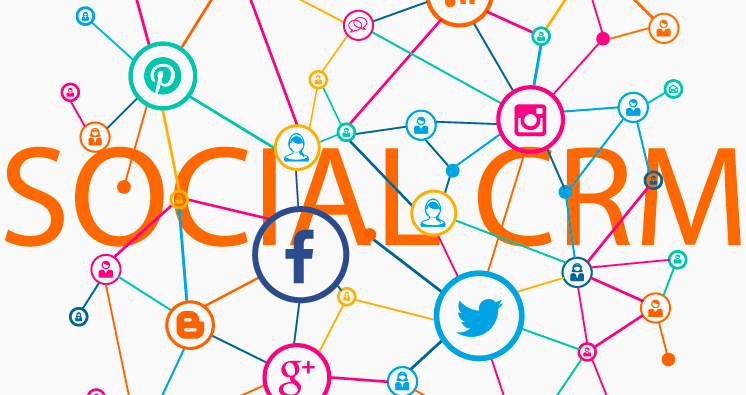Since the inception of social media in the late 1990s, customer service has evolved considerably. Consumers prefer social media over the traditional phone- and email-based customer service. Businesses today are under pressure, more than ever, to value the opinions of consumers and keep track of every single review.
The idea of using social media for customer service happened for the first time in April 2010, when an Icelandic volcano grounded flights across Europe. Customers switched to social media when phone lines were swamped with callers, and airlines like KLM and Brussels had to address them on Twitter and Facebook.
By leveraging social media, organizations can increase their productivity, make changes to their product, and build deeper relationships with their customers. Due to its rapid adoption, small businesses are desperately looking to build their social presence. This has led to a growth in social customer relationship management (CRM) as a tool for organizations and sales professionals to better understand their customers’ preferences and needs.
The stats that represent the current age customer trend are as follows:
- 78% of salespeople using social media outsell their peers. – Forbes
- 42% of consumers complaining about social media expect 60-minute response time – Convince & Convert, LLC
- Customer service interactions over Twitter have increased 250% in the last two years – Conversocial
- Answering a social media complaint increases customer advocacy by as much as 25% – Conversocial
- 77% of people say that valuing their time is the most important thing a company can do to provide them with good service – Forrester Research
The integration of the social suite and CRM solutions have enabled companies to track social interactions with consumers and improve communications. Social CRM can help a marketing team [gs1] by automatically capturing and collating social interactions and monitor prospect or customer behavior in real-time. Consumers use social media to share both positive and negative experiences, and having a tracking system helps you maintain control and dictate the direction of the conversation.
Social media use can make a substantial impact on brand recognition and market sentiment. Below are few examples of negative and positive effects of social media on brands:
McDonald’s #McDStories
During a campaign in January 2012, McDonald’s used the hashtag #McDStories in an attempt to share stories from a farmer that reflected positivity on the brand. However, Twitter users seized control of the hashtag to criticize the company’s food quality and service issues. Before McDonald’s could react, the criticism was all over the internet.
Mis-sell of Dell
In 2005, Jeff Jarvis wrote a blog post titled, “Dell lies. Dell sucks” on BuzzMachine.com. In this article, he complained about the poor customer service he received after purchasing a Dell computer. Originally meant for a rant, the blog soon became an internet storm, with readers leaving comments of their bad experiences. Dell offered Jarvis a new computer and agreed to refund his original purchase, but the damage had already been done.
Both stories shed light on how bad the results of a delayed response can be. Had they paid attention to their customers’ complaints early on, and responded, they could have avoided the eventual outcome they experienced. Social CRM helps you avoid finding yourself in similar situations.
BT (British Telecommunications)
Of all industries, telecommunications is the perhaps one that leverages social media the most. They use social media and live chats to address their customers, which is more cost-effective than phone calls. BT statistics from 2014 show social media customer service deflects 600,000 contacts a year from the phones, resulting in £2M ($2.65M) in annual savings.
L’Oreal
L’Oreal uses an incredibly simple gimmick in allowing its employees to use hashtag #lifeatloreal to showcase the culture of the organization. This sort of transparency not only helped in gaining a positive word of mouth but also retained the employees. This could be simple but has impacted so well that other popular brands have adopted too, like Oracle, Google, Deloitte and more.
Here are just some of the awesome benefits of Social CRM to small businesses:
Evaluate yourself in the competition
Customers rate you based on how you treat them. Once you are aware of your customers’ expectations, you can make the right choices at the right time. Social CRM lets you track all the conversations your customers are having across the internet, providing an unbiased and honest representation of their experience with your products or services. This helps you in measuring your performance, correcting your steps, understanding where you stand against the competition, and knowing what you need to improve to gain a competitive advantage.
Let’s take a look an incident which supports this point. During August 2017, a resident of Bengaluru, India, named Jeroz Nishanth Coelho, tweeted that his hearing-impaired friends were planning a trip from Bengaluru to Mysuru, asking his followers on Twitter to help him decide between Ola and Uber for his transportation needs. Ola grabbed the opportunity before Uber, offering a free ride for all six of them for the entire three days of their trip. What a heartwarming moment! Ola, as you would imagine, earned loads of goodwill by this small gesture.
Stay ahead of the curve
Post all the company updates to social media from within the social suite of CRM, without having to spend money on various applications. Keep your followers informed on the press releases, product updates, and special offers that your company offers.
Using social media, you’ll learn about dissatisfied customers much more quickly. The moment you realize that people are facing challenges in using your product, you can create blog posts or tutorial videos that better explain new features. Also, you can get involved in online forums where you can help newbies with their technology questions. Based on the frequency of similar questions being asked, you can create a knowledge base of frequently asked customer questions in your CRM and share it internally.
Resolve issues
72% of customers who lodge a complaint on Twitter expect a response within an hour. It might sound humanly impossible to achieve, but not so with social CRM. A strong social CRM includes essential helpdesk tools such as cases, tickets and support automation, and allows for the use of social media integrations making it easy to extend support to social channels. You can monitor customer conversations, respond publicly or privately to issues, suggestions, complaints and update support histories in the CRM. All of this helps increase customer satisfaction.
Increase conversions
Small and medium businesses (SMBs) do not have the liberty of losing even a fraction of customers. According to Buyerzone, 91% of companies with more than 11 employees are using a CRM, which highlights the importance of CRM even in a small business scenario. Nucleus Research states that CRM pays back $8.71 for every dollar spent.
Beginning in May 2015, Domino’s let customers order pizzas by tweeting a pizza emoji to the @Dominos Twitter account, or by using the hashtag #EasyOrder. The tweet-based order system earned Domino’s a lot of media coverage from USA Today, Forbes and a Titanium Grand Prix award at Cannes. More than 50% of Domino’s orders come from digital channels today.
Interactive monitoring
It is imperative to keep in touch with your warm leads, lest you lose them in the blink of an eye. A good social CRM lets you be in constant contact with your customers by sending timely emails and analyzing their web behavior. You need to schedule your emails to your warm leads at regular intervals. With social CRM you can even monitor their web behavior and analyze your efforts with real-time notifications that pop on your screen alerting you of high-value behaviors displayed by your prospects. Based on this information, you can take well-informed steps when interacting with a customer and build deeper relationships.
Create your own listening streams
Your LinkedIn, Facebook feeds are flooded with hundreds of posts in a day, and it is almost impossible to identify the customers you are keen on pursuing. With social CRM, you can integrate with various networking sites like LinkedIn, Twitter, Facebook, and Instagram, and follow specific groups and people by creating custom columns to filter the content that’s relevant to your business.
Also, identify the purpose of each platform before branding. Facebook is more of a personal level conversations portal, Twitter is too crowded and tricky to break into, Instagram works on pictures and is good to maintain brand’s life. Leverage the data available on various digital platforms while designing your online presence.

























